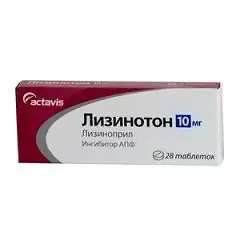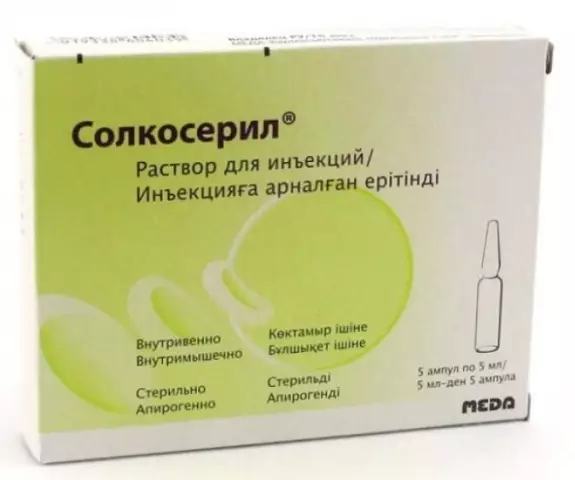- Author Rachel Wainwright wainwright@abchealthonline.com.
- Public 2023-12-15 07:39.
- Last modified 2025-11-02 20:14.
Lysinotone
Lizinoton: instructions for use and reviews
- 1. Release form and composition
- 2. Pharmacological properties
- 3. Indications for use
- 4. Contraindications
- 5. Method of application and dosage
- 6. Side effects
- 7. Overdose
- 8. Special instructions
- 9. Application during pregnancy and lactation
- 10. Use in childhood
- 11. In case of impaired renal function
- 12. Use in the elderly
- 13. Drug interactions
- 14. Analogs
- 15. Terms and conditions of storage
- 16. Terms of dispensing from pharmacies
- 17. Reviews
- 18. Price in pharmacies
Latin name: Lisinoton
ATX code: C09AA03
Active ingredient: lisinopril (Lisinopril)
Manufacturer: Actavis Ltd. (Actavis Ltd.) (Malta)
Description and photo updated: 2018-29-11
Prices in pharmacies: from 75 rubles.
Buy

Lizinotone is an angiotensin converting enzyme (ACE) inhibitor, an antihypertensive agent.
Release form and composition
Dosage form - tablets (10 pcs. In a blister, in a cardboard box 3 blisters; 14 pcs. In a blister, in a cardboard box 2 blisters; each pack also contains instructions for the use of Lysinoton):
- dosage 5 mg: round, flat, white, scored on both sides;
- dosage 10 mg: round, biconvex, light pink (possibly marbling in color), with a risk;
- dosage 20 mg: round, biconvex, pink (possibly marbling), with a line.
Composition of 1 tablet:
- active substance: lisinopril (in the form of a dihydrate) - 5, 10 or 20 mg;
- auxiliary components: sodium croscarmellose, calcium hydrogen phosphate dihydrate, magnesium stearate, mannitol, pregelatinized corn starch. Tablets of 10 mg also contain a pigment mixture PB-24823 pink, tablets 20 mg - a pigment mixture PB-24824 pink.
Pharmacological properties
Pharmacodynamics
The active ingredient of Lizinotone - lisinopril, is an ACE inhibitor. The mechanism of its effect on the body is explained by the ability to reduce the formation of angiotensin II from angiotensin I, which leads to a direct decrease in the release of aldosterone. Some of the drug's effects are due to its effect on tissue renin-angiotensin systems.
Lisinopril reduces the degradation of bradykinin, increases the synthesis of prostaglandins. Expands arteries more than veins. Reduces blood pressure (BP), total peripheral vascular resistance (OPSR), pressure in the pulmonary capillaries, preload. Increases minute blood volume and myocardial tolerance to stress in patients with chronic heart failure.
With prolonged therapy, lisinopril improves the blood supply to the ischemic myocardium, reduces hypertrophy of the myocardium and the walls of the resistive arteries.
Lysinotone prolongs life expectancy in patients with chronic heart failure, and also slows down the progression of left ventricular dysfunction in patients after myocardial infarction in the absence of clinical manifestations of heart failure.
After a single dose of Lizinotone, the hypotensive effect develops after 1 hour, reaches a maximum within 6 hours, and lasts for 24 hours. The duration of the effect also depends on the dose of the drug. With arterial hypertension, the effect is manifested in the first days after the start of therapy, a stable effect develops after 1-2 months.
In the case of abrupt withdrawal of Lysinotone, no pronounced increase in blood pressure was noted.
Lisinopril reduces albuminuria. In case of hyperglycemia, it helps to normalize the function of the damaged glomerular endothelium. Does not have any effect on blood glucose levels in patients with diabetes mellitus, and therefore does not cause an increase in episodes of hypoglycemia.
Pharmacokinetics
Once in the gastrointestinal tract, lisinopril is absorbed in about 30%. Food intake does not affect the degree of absorption of Lysinotone.
Bioavailability - 29%. The maximum concentration is reached within 7 hours and is 90 ng / ml.
Lisinopril practically does not bind to plasma proteins. It penetrates through the blood-brain and placental barriers in low concentrations.
Not biotransformed. It is excreted unchanged by the kidneys. The half-life is 12 hours.
Indications for use
- therapy of acute myocardial infarction with stable hemodynamic parameters in the early period - in order to maintain hemodynamic parameters and prevent the development of left ventricular dysfunction and heart failure;
- monotherapy or combination therapy of arterial hypertension;
- combination therapy of chronic heart failure (in combination with diuretics and / or digitalis drugs).
Contraindications
- hereditary Quincke's edema;
- a history of angioedema (regardless of the cause);
- age up to 18 years;
- pregnancy and lactation;
- hypersensitivity to any component of the drug or other ACE inhibitors.
Lizinoton tablets are used with caution in the following cases:
- severe renal dysfunction, renal failure, stenosis of an artery of a single kidney with progressive azotemia or bilateral stenosis of the renal arteries, conditions after kidney transplantation;
- azotemia, hyperkalemia;
- hypovolemic conditions (including due to diarrhea or vomiting);
- oppression of bone marrow hematopoiesis;
- ischemic heart disease, arterial hypotension, hypertrophic obstructive cardiomyopathy, aortic stenosis, coronary insufficiency;
- primary hyperaldosteronism;
- autoimmune systemic diseases of the connective tissue (including scleroderma and systemic lupus erythematosus);
- cerebrovascular diseases (including insufficiency of cerebral circulation);
- elderly age;
- following a diet with limited sodium intake.
Lizinoton, instructions for use: method and dosage
Lizinoton tablets are indicated for oral administration.
In case of arterial hypertension, as a monopreparation, Lizinoton is prescribed 5 mg once a day. In case of insufficiency of the hypotensive effect, the dose is increased by 5 mg every 2-3 days until the desired result is achieved, but not more than up to 40 mg per day (further increase in the dose does not lead to a more pronounced decrease in blood pressure). The maintenance daily dose is usually 20 mg. The full effect usually develops after 2-4 weeks of therapy, which must be taken into account during the dose titration period. If, after taking the maximum daily dose, blood pressure does not decrease enough, a combination therapy is prescribed.
Patients who received diuretics should discontinue them 2-3 days before starting Lizinotone. If this is not possible, the initial daily dose of lisinopril should be 5 mg. For several hours (approximately 6 hours) after taking the first dose, the patient should be under the close supervision of a physician who will monitor the process of lowering blood pressure (to prevent a pronounced drop in pressure).
In renovascular hypertension and other conditions with increased activity of the renin-angiotensin-aldosterone system (RAAS), it is also recommended to start taking Lysinotone under close medical supervision (monitoring blood pressure, kidney function and serum potassium concentration) at a lower initial dose - 2.5-5 mg per day. The maintenance dose is determined according to the results of the dynamics of blood pressure reduction.
For patients with renal insufficiency, the initial dose of Lysinotone is determined depending on the creatinine clearance (CC). The maintenance dose is adjusted in accordance with the severity of the effect under regular monitoring of renal function and serum potassium concentration.
Recommended starting doses for patients with renal impairment:
- CC 30-70 ml / min - 5-10 mg;
- CC 10-30 ml / min - 2.5-5 mg;
- CC <10 ml / min, including hemodialysis - 2.5 mg.
With persistent arterial hypertension, Lysinoton is usually used in a daily dose of 10-15 mg. Supportive therapy is carried out for a long time.
In patients with chronic heart failure, drug treatment begins with a dose of 2.5 mg once a day, increasing it by 2.5 mg every 3-5 days until the required maintenance daily dose is reached, which, depending on the patient's individual characteristics, can range from 5 up to 20 mg.
Elderly patients, due to the more pronounced duration of the hypotensive effect at the beginning of treatment, Lizinoton is prescribed in a daily dose of 2.5 mg.
In acute myocardial infarction, the drug is used as part of a combination therapy. Lizinotone is prescribed in the following doses: the first and second days - 5 mg each, then - 10 mg once a day. The drug should be taken for at least 6 weeks. In the event that a patient with acute myocardial infarction has low systolic blood pressure (≤ 120 mm Hg), at the beginning of treatment or in the first three days after an attack, the recommended dose of lisinopril is 2.5 mg. If, when taking a dose of 5 mg, systolic blood pressure decreases ≤ 100 mm Hg. Art., it is advisable to temporarily reduce the daily dose to 2.5 mg. With a prolonged marked decrease in blood pressure (systolic blood pressure <90 mm Hg. Art. More than 1 hour) Lisinoton should be canceled.
Side effects
- from the immune system: rarely (<1%) - a syndrome that includes arthralgia, accelerated erythrocyte sedimentation rate (ESR) and the appearance of antinuclear antibodies; very rarely (0.1%) - angioedema (swelling of the face, lips, tongue, larynx or epiglottis, upper and lower extremities);
- on the part of the cardiovascular system: often - chest pain, orthostatic hypotension; rarely - a marked decrease in blood pressure, tachycardia, palpitations, myocardial infarction; in patients at increased risk, cerebrovascular stroke;
- from the hematopoietic system: agranulocytosis, neutropenia, thrombocytopenia, leukopenia; with long-term treatment - erythrocytopenia, a slight decrease in the concentration of hematocrit and hemoglobin;
- from the urinary system: rarely - anuria, oliguria, proteinuria, uremia, impaired renal function, acute renal failure;
- from the digestive system: often - diarrhea, nausea, vomiting; rarely - changes in taste, dry mouth, abdominal pain, dyspepsia, anorexia, pancreatitis, cholestatic or hepatocellular jaundice, hepatitis;
- from the central nervous system: often - weakness, headache, dizziness; rarely - asthenic syndrome, drowsiness, increased fatigue, confusion, mood lability, convulsive twitching of the muscles of the limbs and lips, decreased potency;
- from the respiratory system: often - dry cough;
- dermatological reactions: often - skin rash; rarely - itching, increased sweating, urticaria, alopecia;
- laboratory parameters: hyperbilirubinemia, hyperuricemia, azotemia, hyperkalemia, increased activity of liver enzymes (especially if there is a history of kidney disease, renovascular hypertension, diabetes mellitus);
- others: rarely - fever, myalgia, fetal malformation.
Overdose
Symptoms (occur with a single dose of 50 mg): dry mouth, urinary retention, marked decrease in blood pressure, constipation, irritability, anxiety, drowsiness.
If necessary, symptomatic therapy is performed, including intravenous fluid administration, normalization of blood pressure and water-electrolyte balance. It is possible to remove lisinopril from the body using hemodialysis.
special instructions
Before starting therapy, if possible, it is recommended to normalize the sodium concentration and / or replenish the lost volume of fluid (if such a violation exists). The doctor should carefully monitor the effect of the initial dose of Lysinotone.
A pronounced decrease in blood pressure most often occurs in the case of a decrease in fluid volume as a result of a decrease in salt in the diet, diarrhea, vomiting, dialysis, and diuretic therapy.
An excessive decrease in blood pressure is possible in patients with chronic heart failure (with or without concomitant renal failure). More often this occurs with a severe stage of chronic heart failure, the use of diuretics in high doses, impaired renal function, hyponatremia. In these patients, the use of Lizinotone should be started under the strict supervision of a physician, who will carefully select the dose of both lisinopril and a diuretic. The same prescriptions apply to patients with ischemic heart disease and cerebrovascular insufficiency, since in them a sharp decrease in blood pressure can cause the development of a stroke or myocardial infarction.
In some patients with chronic heart failure with normal or low blood pressure, its further decrease is possible, in this case, discontinuation of treatment is not required.
Transient hypotension is not a contraindication to continuing drug therapy.
In acute myocardial infarction, standard therapy is carried out (acetylsalicylic acid, thrombolytics, beta-blockers). Lysinotone can be combined with intravenous nitroglycerin or therapeutic transdermal systems.
Against the background of therapy, there is a risk, albeit small, of the development of agranulocytosis, therefore it is recommended to periodically monitor the blood picture.
With extensive surgical interventions or the simultaneous use of other drugs that have the ability to lower blood pressure, lisinopril can cause an unpredictable pronounced decrease in blood pressure (due to blocking angiotensin II).
With renal artery stenosis (especially with bilateral stenosis or stenosis of an artery of a single kidney), circulatory failure due to lack of fluid and / or sodium, Lysinoton can cause renal dysfunction and the development of acute renal failure, which is usually irreversible after discontinuation of therapy.
When dialysis is performed using a polyacryl-nitrile membrane, Lysinoton can cause anaphylactic shock. In this regard, it is recommended either to prescribe an antihypertensive agent of a different group, or to use a different type of membrane.
Influence on the ability to drive vehicles and complex mechanisms
There is no information on the effect of lisinopril on the reaction rate and human attention. However, when using Lysinotone, some patients experience dizziness, which should be taken into account by vehicle drivers and persons employed in potentially hazardous industries.
Application during pregnancy and lactation
Lisinopril crosses the placental barrier, therefore it is contraindicated in pregnant women.
If pregnancy occurs during drug therapy, Lisinoton should be canceled as soon as possible. There are no data on the negative effect on the fetus of ACE inhibitors when used in the first trimester. In the II and III trimesters, they have a negative effect on the fetus: a pronounced decrease in blood pressure, the development of hyperkalemia and renal failure, the formation of hypoplasia of the skull, and intrauterine death is possible.
For newborns and infants, whose mothers took lisinopril during pregnancy, careful observation is established in order to identify possible violations in time, including a pronounced decrease in blood pressure, hyperkalemia, oliguria.
It is not known whether lisinopril passes into breast milk. If drug therapy is required during lactation, women are advised to stop breastfeeding.
Pediatric use
Lizinoton is not prescribed until 18 years of age due to the lack of data on its efficacy and safety of use in this age group of patients.
With impaired renal function
Lizinotone is prescribed with caution in the following cases: severe renal impairment, azotemia, renal failure, condition after kidney transplantation, bilateral renal artery stenosis or stenosis of an artery of a single kidney with progressive azotemia.
In renal failure, the dose of Lizinotone is reduced depending on the level of CC. The maintenance dose is set taking into account the clinical efficacy of the drug. Treatment is carried out under intensive control of renal function, serum potassium and sodium concentrations.
Use in the elderly
Differences in the antihypertensive effect of lysinotone in elderly and young patients have not been identified. However, in old age, when using standard doses of lisinopril, there is a higher concentration of the substance in the blood (due to a decrease in the rate of excretion), therefore, it is recommended to start treatment with a daily dose of 2.5 mg under close medical supervision.
Drug interactions
With the simultaneous use of other antihypertensive drugs or diuretics, an additive hypotensive effect develops.
With the combined use of diuretics, lisinopril reduces the excretion of potassium.
Lizinotone should be used with caution in combination with potassium preparations, potassium-sparing diuretics (triamterene, spironolactone, amiloride), potassium-containing salt substitutes, since the likelihood of hyperkalemia increases, especially in patients with impaired renal function. The decision to use such combinations can only be made by the attending physician. Treatment is carried out under the control of renal function and serum potassium levels.
Ethanol enhances the effect of lisinopril.
Cholestyramine and antacids reduce the absorption of lisinopril from the gastrointestinal tract.
The antihypertensive effect of lisinopril is reduced by estrogens, adrenostimulants and non-steroidal anti-inflammatory drugs (including indomethacin).
Lisinopril reduces the excretion of lithium, therefore, if necessary, the simultaneous use of drugs should control the serum concentration of lithium.
Analogs
Lizinotone analogs are Accupro, Amprilan, Angiopril-25, Arentopres, Berlipril, Vasolong, Vero-Captopril, Hypernik, Dapril, Diroton, Irumed, Capoten, Captopril, Lizacard, Lisinopril, Perineopril, Perineopril, Perinepril, Perinepril, Renitek, Tritace, Fozikard, Fosinopril, Hartil, Enalapril, Enam, Enap, Enapharm, etc.
Terms and conditions of storage
Keep out of reach of children at a temperature not exceeding 25 ° C.
The shelf life is 3 years.
Terms of dispensing from pharmacies
Dispensed by prescription.
Reviews about Lizinotone
Reviews of Lysinotone are few, but positive: the drug effectively reduces high blood pressure, stabilizes the condition in chronic heart failure, is well tolerated without side effects (even in old age).
The price of Lizinoton in pharmacies
Approximate prices for Lizinoton (per package containing 28 tablets): dosage 5 mg - 123 rubles, dosage 10 mg - 156-188 rubles, dosage 20 mg - 217-252 rubles.
Lizinoton: prices in online pharmacies
|
Drug name Price Pharmacy |
|
Lizinoton 10 mg tablets 28 pcs. RUB 75 Buy |
|
Lizinoton 5 mg tablets 28 pcs. 82 RUB Buy |
|
Lizinoton 20 mg tablets 28 pcs. 159 r Buy |
|
Lizinoton tablets 10mg 28 pcs. 169 RUB Buy |

Anna Kozlova Medical journalist About the author
Education: Rostov State Medical University, specialty "General Medicine".
Information about the drug is generalized, provided for informational purposes only and does not replace the official instructions. Self-medication is hazardous to health!






